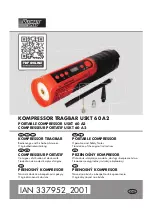
13-17-601 Page 52
6-3
5. Inspect core area. If blocked with debris, use a moderate (e.g., 100psi) source of compressed air
and/or water while directing nozzle (pointed through core to outside) to dislodge debris and clean.
Vacuum (applied from outside) can also be employed to clean the heat exchanger cores.
6. Remove all loose debris and water from cooler box after cleaning process is complete.
7. Re-attach cooler housing side covers with provided fasteners and re-install enclosure door panels.
Figure 6-2 – COOLER HOUSING SIDE COVERS
Automatic restarting or electrical shock can cause injury or death. Disconnect,
lockout and tagout package from the power supply.
AXIAL COOLING FANS
1. Follow Lock-Out Tag-Out procedures to de-energize the package. Allow adequate time for the
VFD capacitors to fully discharge before beginning maintenance.
2. Exercise caution around compressor parts after stopping the package for service. Fans and coolers
will be hot after stopping the compressor.
3. Remove access panels and guards as needed to gain access to the fan blades.
4. Cover motors, mixing valves, fan motors and other electrical components to prevent damage from the
cleaning process.
5. Use a mild detergent or degreaser to soften and dissolve accumulated grime.
6. Using a soft cloth or sponge, remove the surface grime from both sides of the blade surface.
7. Wipe up and remove all traces of cleaning residue and cleaning materials.
8. Reinstall all access panels and guards that were removed to access the fans.
9. Follow Lock-Out Tag-Out procedures to re-energize the package.
10. Jog fans to verify there is no interference with the guard or cowling ring before the package is placed
back in service.
All axial cooling fans should be inspected and cleaned at the same interval as the heat exchangers are.
Ambient conditions will determine the actual maintenance interval at each installation
WATER-COOLED HEAT EXCHANGERS
– Optionally water-cooled cores (fixed shell-and-tube type) are
available. The air core is a single pass (air in the tubes) design and the oil core is a double pass (oil in
the shell) design. The cooling water is fed to the cores in a series arrangement
– it passes through the air
core first and proceeds through the oil core before exiting the package. Please refer to Figure 6-3 for
estimates of requirements.















































